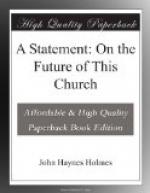It very soon became clear to me, however, that personal considerations could rightly have but little part in the settlement of this problem. In no spirit of bravado, but in simplest recognition of the truth, I say to you that I believe I would have been betraying the profession which I have sworn to serve had I permitted conditions of personal affection, however lovely and precious, to determine my decision in this case. I take seriously the fact of my ordination—that as a minister of religion I have been “set apart,” as the traditional phrase has it, to the high purpose of propagating an idea, championing a cause, seeking the best and the highest that I know in terms of God and of his holy will. I am here, in other words, not to make or to keep friends, not to enjoy pleasant associations of hand and heart, not even to serve a particular church, but to serve, perhaps at the cost of these other and more personal things, the great idea of which I speak. To allow my individual sentiments to fix the place and fashion of my professional service, would be to me as dastardly a thing as to allow considerations of profit or prestige to make decision. Not even my wife or my children could interfere in this case. My problem was to determine where I could best advance the ideals to which I have given my life—where I could find the weapons or tools best fitted to my hand for the doing of my work—and there to stand. To remain in this church and city might be infinitely desirable to me as a man; but I must decide not as a man but as a minister, and therefore if I remained, it must be because I could do no other!
But there was another consideration which held me to this impersonal relation to the problem. I refer to the fact that the Great War had brought to a focus in my own soul the inward and largely unconscious spiritual development of a decade. I had discovered, through [4] much tribulation of mind and heart, the ideal which I sought to serve, and disclosed to myself at least the picture of the realization of this ideal in institutional form. This same Great War, however, had distracted my parish, absorbed the energies and attention of my people, and in spite of wellnigh unexampled forbearance, had introduced elements of misunderstanding and even alienation. The conflict, in other words, had no more left our church unchanged than the world itself. We had been shaken and distressed and tortured and driven, so that we were no longer the persons we once were. You knew me, and I knew you, as we were yesterday; but we did not know one another as we were going to be, or should want to be, tomorrow. It was necessary that we should meet not on the plane of the past, nor even of the present, but on the plane of the future, and thus find ourselves again, and discover what now, in this new world, we wanted, and would be able, to do together. Months before the War was ended, it had clearly entered into my mind to summon you to conference on our future




